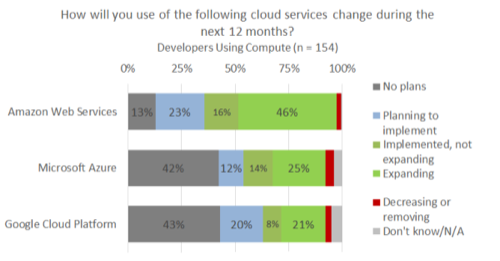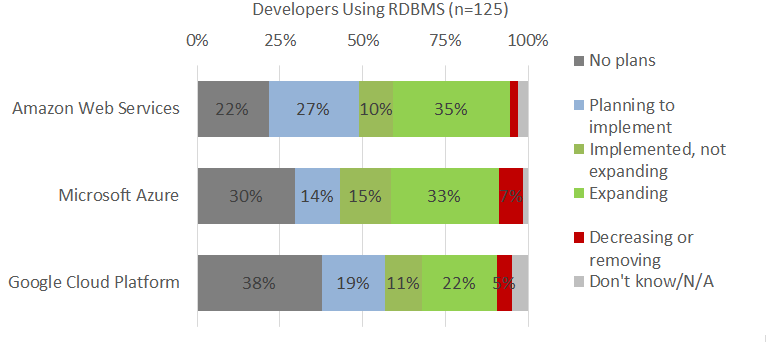
Amazon Web Services (AWS) clearly leads the Infrastructure-as-a-Service (IaaS) market and by some distance. But whether developers should follow AWS largely depends on where they want to go, according to new research from Forrester. Not only does this require a choice between Platform-as-a-Service (PaaS) offerings and IaaS, but there’s also real IaaS competition brewing for AWS from Microsoft and Google.
The easy choice of “AWS or more AWS?” may be about to disappear.
Why Amazon Wins In Cloud
But let’s not get ahead of ourselves. For now, AWS offers five times the utilized compute capacity of each of its other 14 top competitors—combined. That’s a big lead, and stems from AWS’ quasi-religious focus on its customers’ needs, as Gartner’s Lydia Leong offers. Couple this with a “willing[ness] to invest massively in engineering” and “iterate at shocking speed,” and you get a sense both for why Amazon has been so successful, and why it’s so hard to catch up.
Small wonder, then, that Forrester’s developer survey finds that AWS has a clear lead, with 62% of developers surveyed indicated that they’ve implemented AWS already, with another 23% planning to do so. The numbers for Microsoft and Google are not nearly so good:

Amazon has been looking to extend this lead by making its IaaS offerings more enterprise friendly. Importantly, Amazon isn’t building out a separate enterprise cloud, but instead is meshing enterprise features with its public cloud, a strategy that jibes with Leong’s belief that “customers actively do not want two different clouds, since nobody really wants to shift between different clouds as you go through an application’s lifecycle, or for different tiers of an app, some of which might need greater infrastructure resilience and guaranteed performance.”
And lest anyone think AWS simply serves the rinky-dink individual developer with a dev/test workload, Leong stresses that its customers are decidedly “traditional enterprises of the Global 2000 variety (including some of the largest companies in the world),” in addition to the mid-market, “projected spend levels… increasing dramatically… use cases [that] are extremely broad,…[with] workloads [that] increasingly have sensitive data and regulatory compliance concerns.”
So, game over, Amazon wins?
Cloud Competitors Rising
Not so fast. If ever there were a market with deep-pocketed competitors who can financially afford to catch up and compete, this is it. And, as Forrester’s Jeffrey Hammond argues, “We’re moving away from distinct leaders in a single market segment, like IaaS or PaaS, and toward a model that mirrors a traditional buying pattern, where app development professionals choose between best of breed services (e.g., compute, storage, RDBMS, messaging, CRM) or integrated data-centers of services (AWS, Microsoft Azure, Google Cloud Platform, Salesforce/Heroku/Database.com).”
In this world where buyers focus on best-of-breed, AWS doesn’t necessarily always have the upper hand.
For example, Microsoft already competes quite well with AWS when it comes to developers using a cloud relational database (RDBMS), as Forrester’s survey finds:

This could be a function of enterprises turning to a trusted database provider for their RDBMS needs. It could just be a short-term blip as enterprises explore other cloud database offerings, an area in which AWS excels and Google is growing.
Or it could just be, as Hammond suggests, that one-cloud-size-does-not-fit-all.
In such a world, according to Leong, different cloud vendors bring different strengths, and each of the two primary challengers has pockets as deep or deeper than Amazon. Take Microsoft, for example. “Microsoft has brand, deep customer relationships, deep technology entrenchment, and a useful story about how all of those pieces are going to fit together, along with a huge army of engineers, and a ton of money and the willingness to spend wherever it gains them a competitive advantage.” And what about Google? “Google has brand, an outstanding engineering team, and unrivaled expertise at operating at scale.”
Lots To Play For In Cloud
In short, we’re a long way from deciding an absolute winner in cloud computing. In part this is because we’re still in the early days of adoption, and in part it’s because, as Hammond insists, developers are increasingly buying the best tool for a particular job. Amazon has established a clear leadership position, but it isn’t the only cloud vendor with a strong cloud story. Microsoft still needs to overcome its Microsoft-centric approach to the cloud (and everything else), and Google still needs to figure out how to operate like a business that enterprises can understand and buy from, but these are solvable problems.
One thing is clear: as these problems are solved, an interesting but not particularly competitive cloud market will become even more interesting, and much more competitive.
Image courtesy REUTERS/Shannon Stapleton.




















